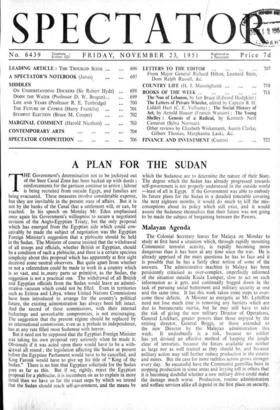A PLAN FOR THE SUDAN
THE Government's determination not to be jockeyed out of the Suez Canal Zone has been backed up with deeds ; reinforcements for the garrison continue to arrive ; labour' is being recruited from outside Egypt, and families are being_ evacuated. These measures involve considerable expense, but they are inevitable in the present state of affairs. But it is not by the banks of the Canal that a settlement will, or can, be reached. In his speech on Monday Mr. Eden emphasised once again his Government's willingness to secure a negotiated revision of the Anglo-Egyptian Treaty, but the only proposal which has emerged from the Egyptian side which could con- ceivably be made the subject of negotiation was the Egyptian Foreign Minister's suggestion that a plebiscite should be held in the Sudan. The Minister of course insisted that the withdrawal of all troops and officials, whether British or Egyptian, should be a condition of such a plebiscite, and there is a certain specious simplicity about this proposal which has apparently at first sight deceilied some neutral observers. But quite apart from whether or not a referendum could he made to work in a country which is so vast, and in...many parts so primitive, as the Sudan, the suggestion is not a practical one. The withdrawal of all British and Egyptian officials from the Sudan would leave an admini- ' strative vacuum which could not be filled. Even in territories such as Eritrea and Libya, where United Nations Commissions have been, introduced to arrange for the country's political future, the existing administration has always been left intact. And the record of these commissions, with their internal bickerings and unworkable compromises, is not encouraging. The suggestion that the present regime should be replaced by an international commission, even as a prelude to independence, has at any rate filled most Sudanese with horror. But it need not be supposed that the Egyptian Foreign Minister was taking his own proposal very seriously when he made it. Obviously if it was acted upon there would have to be a with- awal all round ; the legislation affecting the Sudan at present before the Egyptian Parliament would have to be cancelled, and King Farouk would have to give up his title of " King of the Sudan." There is no hint that Egyptian solicitude for the Sudan goes as far as this. But if we, rightly, reject the Egyptian proposal for a plebiscite, it is incumbent on us to explain in more detail than we have so far the exact steps by which we intend that the Sudan should reach self-government, and the means by which the Sudanese are to determine the nature of their State. The degree which the Sudan has already progressed towards self-government is not properly understood in the outside world —least of all in Egypt. If the Government was able to embody its future plans for the Sudan in a detailed timetable covering the next eighteen months, it would do much to kill the mis- conceptions about its policy which still exist, and it would assure the Sudanese themselves that their future was not going to be made the subject of bargaining between the Powers.


































